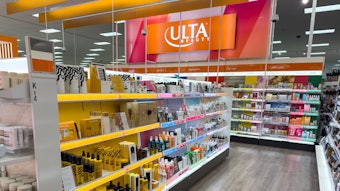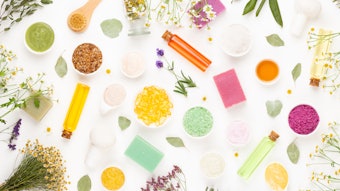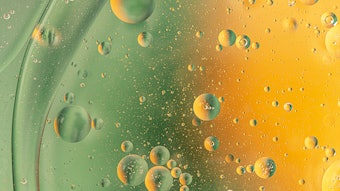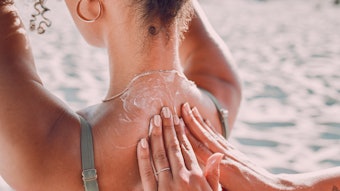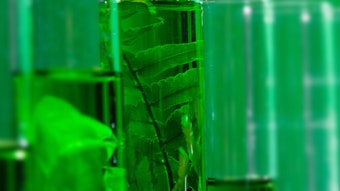- Simply labeling a product as natural is not enough to make it stand out among the plethora of green beauty goods.
- Don’t delve into the intricacies of the ingredient sourcing process—telling your product’s sustainability story in a unique and meaningful way is enough to grab a consumer’s attention.
- If suppliers are providing ethically sourced ingredients, they want brands to know about it and are likely happy to provide you with information that can be conveyed to consumers.
- When the relationship between brand and supplier is strong, the brand is proud to tout the source of its ingredients.
Now that green beauty has become the new norm, more and more beauty brands are achieving commercial success by tweaking, or even overhauling, their lines. They’re going beyond nature-inspired fragrances and recyclable packaging and using environmentally friendly, responsibly sourced ingredients that consumers have grown to demand. According to global market research firm Mintel, in 2010, 13% of new skin care, hair care and cosmetics made the paraben-free claim, a 5% increase from 2008—while nearly 9% of new products in those categories made the organic claim, which is twice as many as in 2007.
As a result, simply labeling a product as natural is not enough to make it stand out among the plethora of green beauty goods anymore. Savvy consumers know that a claim of “natural” holds very little water, and as green products flood the marketplace, they’re looking for explanations of how your products go above and beyond to deliver benefits without causing harm to the planet. Strong partnerships between brands and suppliers make this a natural process.
Simple and Straightforward
Don’t worry about delving into the intricacies of the sourcing process; rather, telling your product’s sustainability story in a unique and meaningful way is enough to grab a consumer’s attention. “Simplifying text and ‘stripping back’ to tell straightforward, direct stories of plant-based ingredients will be key, and manufacturers who treat consumers as educated shoppers instead of novices stand to benefit,” asserts Vivienne Rudd, senior beauty analyst at Mintel.
There’s no need to reinvent the wheel—if your supplier is providing ethically sourced ingredients, they want you to know all about it and are likely happy to provide you with all the information about them in easy-to-understand terms that you can convey to end consumers as well.
“We are proactive in communicating to our customers how we put into practice our sustainable development approach,” explains Stewart Warburton, global marketing director of home and personal care for Rhodia Novecare, an international ingredient supplier that emphasizes sustainability throughout its operations. “We published a Sustainable Solutions Guide to promote our various ranges of key products that fit particularly well with the sustainable approach, covering a set of different criteria and benefits for both customers and end consumers. The objective of the guide is to help the [product development teams] create consumer products with more eco-friendly profiles while maintaining outstanding performance.”
Arizona Chemical is a supplier founded on renewable resources. “As the world’s largest bio-refiner of extracts from the pine tree, Arizona Chemical strives to use raw materials that have the highest amount of bio-renewable carbon in our manufacturing process,” says marketing specialist Tammy Gaffney. In fact, the extracts refined by the company are by-products of the wood pulping process used to produce paper, so they go into beauty formulations rather than going to waste—a fact that beauty brands can emphasize in their marketing.
Mutual Benefits, Mutual Credit
When the relationship between brand and supplier is strong, the brand is proud to tout the source of its ingredients. “Nature’s Gate and Bayliss Ranch, both pioneers in the natural personal care industry, established their long-standing relationship more than 20 years ago,” says Jennifer Schweitzer, brand manager for Nature’s Gate. To this day, each bottle of Nature’s Gate product includes the following paragraph on the back panel: “Our Certified Organic Extracts are fresh from the field, locally grown in California on land dedicated to growing Nature’s Gate botanical essences. At the family owned Organic farm, each plant receives individual care, ensuring the highest purity and quality. The farm’s water source is derived from the winter rains and snow pack of the Sierra Nevadas.” The website for Nature’s Gate also includes a special section to explain its commitment to sustainability and the role Bayliss Ranch plays in achieving it.
And in some cases, the benefits delivered to both the brand and the supplier go far beyond advertising. “We are very proud to be involved in supporting The Shea Butter Project by incorporating them into our products,” says April Westley, creator of East Sussex, UK-based Cupcake Organic Divine Skin Care. “Georgina Koomson started this project in Ghana and organized several hundred women in a community that has a capacity of over 1,000 tons of shea butter production of the highest quality. All the shea butter is delivered in beautiful handwoven baskets, the making of which supports several dozen more families.
“And, our organic shea butter has just received Fairtrade International certification, so we can now offer the first and only organic fair trade shea butter in the world,” claims Westley.
Meaningful Labels
Although many more companies and their offerings are becoming certified as organic, established brands will still want to promote themselves as such, especially if it’s key to their company’s philosophy. Rhodia, for one, makes it easy. “Among the criteria we use [in the Sustainable Solutions Guide] are end-product compliant with the eco-labels, such as Natural Product Association, Whole Foods or Ecocert— and ingredients [meet requirements to support] suitable claims and formulations requirements, such as sulfate-free or dioxane-free,” says Warburton. “By publishing the sustainability profile of our ingredients, [product development teams] can choose the most appropriate ingredient to help them best promote a specific sustainability claim.”
“It takes three years to get products certified to Ecocert standard, which ensures that 100% of the total ingredients are of a natural origin,” explains Westley. “Ecocert is the leading European authority on organic certification and the standards used by prestige organic brands.” As a result, Cupcake Organic’s website (www.cupcakeorganic.com) and packaging prominently features the Ecocert logo, along with information regarding the brand’s fair trade and vegan policy.
“[Consumers interested in these type of products and claims] don’t just care about the planet—they care about the humans on it, and how they can best serve themselves on it with good intentions and sustainable ideas,” Westley adds. When you can prove to your customers with sincerity that your brand is ethically responsible, much like consumers want to consider themselves to be, it can only lead to positive results. n GCI
Lisa Doyle was formerly the associate editor of GCI magazine and is a freelance writer in the Chicago area. Her work has appeared in Skin Inc. magazine, Salon Today, America’s Best, Renew and Modern Salon.



